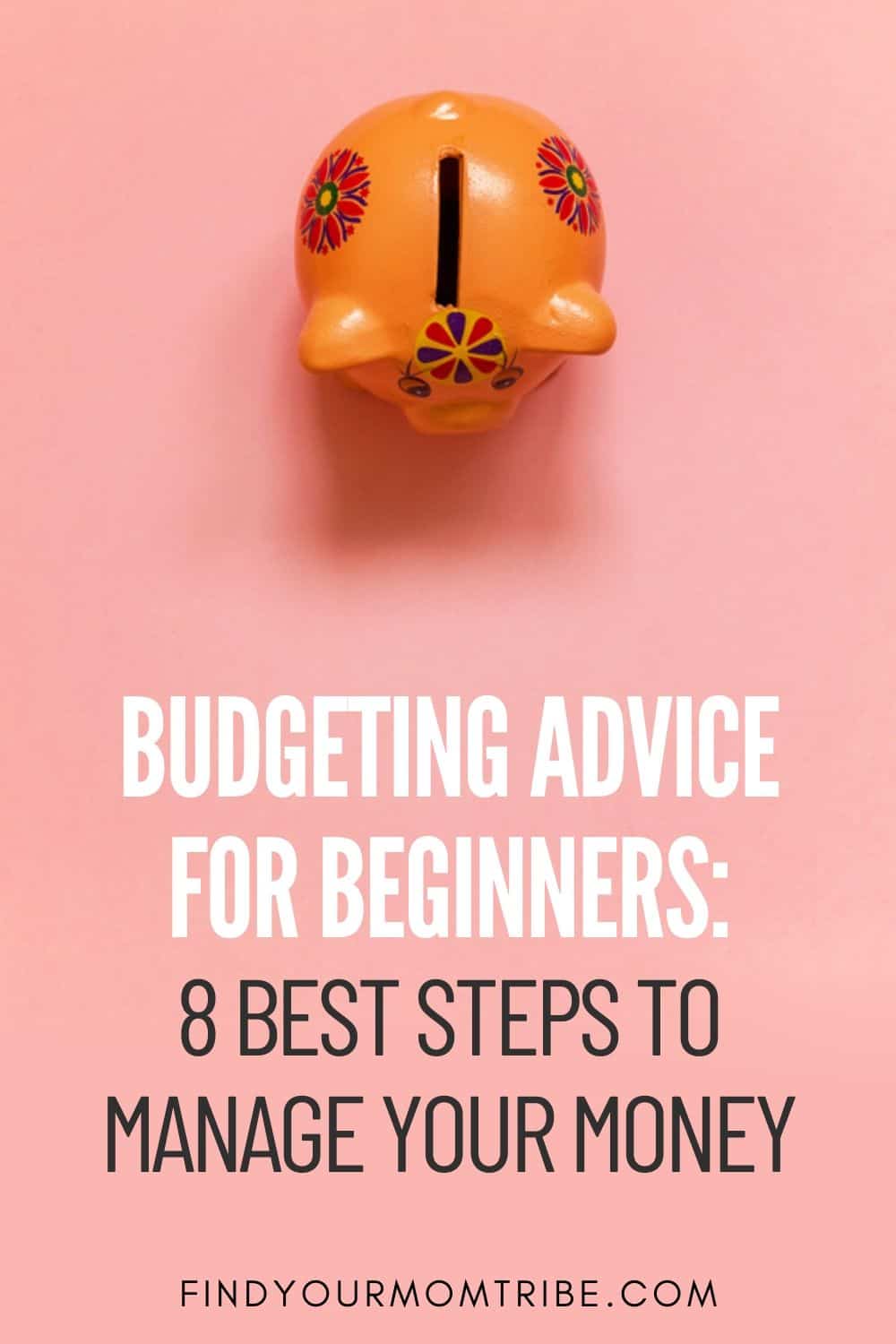Making a budget is the crux of every single piece of financial advice you’ll ever hear – and for good reason.
But what if you don’t really know how to do so?
Maybe you’re just dipping your toes into the financial world or you’re looking for advice on how to tighten the belt when it comes to spending money?
Well, that’s why I’m here writing these tidbits of budgeting advice for beginners.
The first thing you need to figure out is what a budget represents.
A budget is a written representation of all your earnings and expenses. This includes debts, luxuries, bills and such.
Trust me when I say it’s much easier when you have one in written form than keeping one in your head.
It makes it a lot simpler to track numbers since they will add up quite quickly and you’ll lose yourself if you don’t put it to paper (or PC).
The sooner you start managing and taking control of your personal finances, the sooner you’ll be able to efficiently work towards all of the things you want to buy or get, because you’ll be able to save money a lot better as well.

Plus, diligent updates of your financial records will have a stronger impact on improving your willpower and resolve when you start wasting money and need to stop, preventing unnecessary overspending from occurring.
Another great benefit is that if you manage to get your budget well enough in order to pay off all of your bills and debts, your credit score will start improving, which means better repayment rates for future loans from your bank, among other perks.
But how do you go about starting one?
Well, the initial necessity isn’t material, but rather it’s mental. You need to realize that you want to get your financial life in order and secure a prosperous financial future.
What this means is coming up with the resolve to actually start making a budget.
Starting is the most difficult, as inputting all of the numbers tends to scare a lot of people off.
But once you’re done, I guarantee the rest of it just comes down to a simple routine.
I guarantee that you’ll start feeling the positive effects of a budgeting lifestyle in a few months and you’ll be a lot more responsible with your spending (plus, you’ll have some money saved up that you can plan out what to spend on).
Anyway, now that that is all said and done, it’s time to start digging into some actual budgeting advice for beginners and veterans alike.
Budgeting Tips: Forming Your Ideal Plan
1. Determining the goal of the budget
The first thing a person does when making a budget is ask themselves what this budget is for.
Are you looking to start crawling your way out of a debt that accumulated over the years?
Maybe you want to buy a new house, or maybe it’s for a fancy vacation planned in May? Possibly that new car or just wanting to be more financially stable?
Whatever the reason, you need a budget for it if you’re intending to save up efficiently.
Only 33% of all American households ever decide to start budgeting as a lifestyle choice and they’re a lot happier for it.
I assume you would be too, because budgeting will give you the motivation to fill the necessary quotas in and go through with your plan of obtaining the necessary capital for your goal.
It’s no secret that a family without monetary troubles tends to fight less, since money is the root of almost all our problems. Thus, a financially stable family is a happy family.

Though when you set a goal, you should be a lot more precise than just saying “I want to save up for a new car.”
You should form it in a way that gives you a fixed goal to work toward – something like “I want to save up $3,000 for the first down payment on a new car” or something along those lines.
Now you have a feasible goal you can work toward and an easier way to track your progress.
Another good thing is to always set a deadline for this specific goal, otherwise you’ll just end up loafing around and putting it off like many people do.
Budgeting is all about making that deadline and finding the most efficient ways of doing so without drastically changing your lifestyle.
If you don’t set one, there is simply no point to budgeting in the first place.
Budgeting veterans know this, but it’s always nice to get a refresher course since this is the most crucial bit of budgeting advice for beginners: Have a goal and have a deadline for said goal.
2. Do research to find out how much your household is spending
I say household because you aren’t the only one racking up the bills in the house; your partner and your kids hold a sizable portion of those same expenses as well.
This process might take some time, as tracking down past bills is a nightmare if you haven’t been staying organized before, or looking at past bank statements and realizing you don’t know what you spent a certain amount of money for.
The longer you spend on this step, the more accurate your average monthly spending will be and the more you’ll be able to determine what you can start budgeting on.
This is the best place to start jotting these down, as they’ll just get all jumbled up with other numbers in your head.
You can use budgeting apps or excel spreadsheets, but a good old financial planner works just fine at the end of the day too.

Organize properly and categorize everything to get a better picture of what goes where.
Working it out in some sort of calendar fashion is rather neat too to show you the timeframe these monthly expenses occur, allowing you to strategize a lot better since you’ll get familiar with your and your families’ spending habits.
This is especially accurate when you have some irregular expenditures – one-offs that occur once a year – and having a calendar will help you prepare for these a lot better.
These are usually something along the lines of bills for annual medical checkups, some sort of birthday or holiday, car registration, and the like.
Just make sure to jot it all down to get the foundation laid for your budgeting plan.
3. Find out how much income your household is receiving
This is the complete opposite step compared to the previous one – one where you look at all of the sources of income you as a family are getting.
This will usually be income from the wages of any jobs you and your partner have (alternatively, child support, god forbid), any side jobs you might be taking, or if you have enough capital to wave around, some of your investments you, well, invested into.

I would suggest marking the dates of when this income comes in much like one would for the expenses bit of these budgeting tips.
That way, you’ll be able to spread your income to cover your expenses a bit better without creating a large hole in your stash every time you do.
This will be the baseline of how much you have available to budget around and where the start of some of the more noticeable changes start taking effect.
4. Plan out just how much you’ll need to save
This is why the fixed plan and the deadline were important in the first step.
This will let you determine just how tight of a budget you’ll need to make. It’s not the same to budget toward a new TV versus a new car.
A TV might go upwards of $1,000 but a car can get up to ten times that much, if not more, depending on what you’re getting.
Here is where you do some math and come to grips with reality, depending on how good your income compared to your expenses is.
This is what’ll be your Total Budget, the number that comes after you deduct your monthly expenses from your monthly income.
But that’s not where this ends, as you might not want to place the entirety of your total budget over to savings (or maybe you do, who am I to judge?)
You might need to have something left over to let your kids buy a soda or something once in a while or to have money for a coffee or something of the sort.

Anyway, if you’re planning on still keeping some spending money around – If, for instance, you put a longer deadline where you don’t want to feel a heavy pressure on the lifestyle you’re used to – then I suggest not looking at the salary that you’re getting right now as what you have to spend for the month.
Rather start taking a percentage of it only and learning to cut down on a few luxuries you afford yourself.
Those daily Starbucks coffees add up to quite a lot of money over the month that you could have funneled toward your budgeting goal – you can afford to skip a few of them.
Sure, giving up anything is hard, but some sacrifices must be made to escape the paycheck-to-paycheck lifestyle most of us Americans tend to have, and a lot of it comes down to how prepared we are to cut down on some things to make room for others down the line.
Once you get that down, you’ll see the extra money pile up. Extra money that you can and should put into your savings to be able to realize that budgeting goal even sooner than intended.
An ideal plan on paper maybe, but one that takes a lot of will to put into action.
One thing to note, though, is that not all of it should go toward your designated budgeting goal either.
You want to keep a portion of it around in case of emergencies. Who knows what might happen during that period.

It’s always nice to have a backup fund to be able to tap into to resolve something like a medical issue quickly, rather than having to suffer through it.
The aforementioned salary-cutting methods correspond to two different methods of saving: the zero-sum budget and the 50-30-20 budget.
Which one you take is up to you.
A zero-sum budget is one where you meticulously assign portions of your income to every expense with the rest of it going to savings, leaving little room for personal luxury.
If you or your family are having problems not controlling your money or have issues with overspending, this might be the right one for you.
That said, it does come off as a very controlling method of budgeting and is certainly not the best piece of budgeting advice for beginners to start off with this one, as a lot of you might find it very hard to separate yourself from your habits.
For you, I’d suggest the 50-30-20 budgeting method.
A 50-30-20 budget is one where you split your income down to percentages with 50% going toward covering your expenses.

The other 50% is split, where 30% goes toward luxuries (this is the money you can spend freely) and the remaining 20% is set off for savings.
Of course, these figures aren’t fixed, since some households might need less of their income to cover their expenses while some might need more.
So feel free to work these numbers around, but make sure to still keep the three main categories in mind.
If you’re taking away from anything, then take away from the percentage in the middle rather than that which you’re funneling toward your budgeting goal.
You don’t have to handle budgeting by yourself either.
You can choose to let many of the apps on the market do it for you (Mint, PocketGuard, and the like), some of which will do all the hard and tedious math work for you so you can have more time for yourself.
5. You’re not alone in this (hopefully)
Sometimes you might be, depending on the way your household operates, but it’s still wise to call a family meeting if spending is getting too out of hand and you need to start doing some financial planning to get your monthly bills in order.
While it’s unreasonable to ask your kids to contribute, you can tell them that they might be getting less pocket money or their cell phone use may be limited to account for covering expenses and cutting down on that phone bill drastically.
While it’s not ideal, it’s necessary for everyone to contribute to make this as efficient as possible.
The same goes for you and your partner.
You’ll be the two that will have to make the most effort and should realistically be expected to do so.
You can only maintain your expenses so much, but you need to get your partner involved in this too.

If he racks up a large bill without knowing that you won’t be covering for it, you might end up in a lot of financial trouble and a lot of relationship stress caused by that trouble.
This is why calling a meeting is important – to keep everyone on the same page on what the plan is or discuss alterations to said plan and why budgeting right now is beneficial to the entire family.
The goal cannot be selfish, otherwise you may as well just be doing it alone.
Plus, it helps to just talk it out with your family.
Maybe there’s not even a need for said budgeting goal if nobody even really needs it, letting you ease up on both them and yourself in having to worry about adjusting your lifestyle too much.
Maybe you can start working on budgeting up on something you all would actually need. No point saving up for a trip everyone but you would hate, right?
6. Putting it all out there
Now that we have all of our bases covered, it’s time to start forming this new budget of ours.
With the goal determined and your expenses and incomes calculated, it’s time to sort.
First, form some categories, something that’ll be recognizable for you and help you sort things out better for when you start placing different parts of your expenses and income into them.
Things like living expenses, luxuries, savings, emergency fund and similar are what you should be aiming towards – just make sure the numbers line up roughly toward your desired budgeting plan.
If you’re going zero-sum, all of your money should have their position delegated somewhere and the “salary” bit would not exist.

If you’re going with the 50-30-20 method, then you should relegate your earnings accordingly, as well as have some wiggle room to still put some of that into the emergency fund in case something unexpected were to happen.
Once you’re done, give it a look over and compare.
If what you spend outweighs what you earn, it’s time to start doing the cutbacks so your monthly budget can thrive.
Find the problem spots and work out how much you can realistically cut back.
No point in slashing a budget down drastically for an expense if you know you cannot live without that being covered fully.
Either that, or start taking some extra work up – there are no other ways around it, I’m afraid.
Regardless, spend a lot of time on this, at least enough until the numbers start making sense and you’re in a net gain.
7. Do monthly budget reviews
Once you’re all set up, you aren’t really done quite yet.
Budgets still take daily maintenance, as sometimes you might make a slight error in your math or something may have come up that changed the figures up slightly (a promotion, an illness, etc.)
This is where the emergency fund would normally come in, but it’s still good to check and see if the emergency fund can actually cover all of that up, since the problem might be a recurring one.

That, or someone might have slipped up and not stuck to the budget.
It’s up to you to discover the root of the problem and resolve it in a peaceful manner to avoid any unnecessary stress.
Mistakes are unavoidable. After all, we’re all human still and humans make mistakes.
Planning is nice and all, but practice makes perfect.
Call up some more family meetings if needed to discuss the problems and see how you can work through them, so everyone can be happy while still contributing toward this group effort.
8. Be a role model to the family in terms of budgeting
It’s not enough to say that you’re saving up, you have to show it through your own actions.
Show them how many things you can actually live without and how much extra income it brings to the household.
Of course, this also means holding yourself accountable for any gaffs you might make during this budgeting endeavor. Not everyone is born with iron clad discipline, after all.
The easiest ways you can do this is through several methods.
The best one is to just set your savings accounts to be just like your budget looked like: each of them getting a designated portion of money once your salary arrives so it never really gets into your hands (so to speak).
That way, you can withhold from those prior spending urges.

Another method is to just set your budgeting app (if you have one, otherwise skip this step) to alert you once you’re getting close to exceeding the spending limit on your designated budget.
An extra reminder to help keep those said urges at bay and turn you into a more accountable person.
You can also try to just use cash and keep your credit cards at home, only taking the amount you expect to pay out so you keep yourself on a metaphorical leash and keep those savings safe in your bank account by leaving the key home.
Finally, you can stick to an old-fashioned system of just putting your income into separate envelopes that, once again, match your budget and only ever access the one that’s designated as your salary (again, an irrelevant step if you’re going zero-sum), helping you get adjusted to a lower spending budget in a more efficient way.
If you manage to keep yourself from breaking the rules you’ve set for yourself and help other family members do the same, you’ll see them put a lot more effort into it and all be able to meet your goal much quicker and in a much efficient manner than you would have otherwise.
Common budgeting mistakes
The best piece of budgeting advice for beginners that I can give is that you will probably not get everything right the first time.
You can’t expect to perfectly balance out every dollar that goes into every pocket of your well-envisioned budget; something is bound to slip up.
That in and of itself is not as big a problem. The biggest problems are created by you and impact you and your family.
One of the main problems is you trying to be the only person in control of the family budget.
This leads to a lot of turmoil within the family and may cause the plan to fall apart before you even started. Get your family in on it, otherwise risk failing right at the start.
The second problem is trying to go for multiple goals at the same time.

This sets a lot of unrealistic expectations that you will most certainly not be able to meet and spread you way too thin to ever make any significant progress, depriving you of a sense of achievement and of any of those things for a long time.
Work toward one goal at a time; the others will follow through soon and making a budget for them will be easier as you can transfer portions of the planning you did for this one to it (namely the expenses).
Another big problem is thinking that only the small expenses matter.
This is probably one of the worst states of mind you can put yourself in.
While sure, putting a thermostat in to cut down on heating bills is nice and all, you don’t really need a second car nor do you need to get the most expensive stuff to impress your friends.
The big, one-off things do matter in the long run.
Another issue is failing to keep an emergency fund.
This one is rather glaring as many people tend to overlook it, then find themselves in a bind when an unexpected disaster occurs, and they have to scramble and redo everything just to dig up some spare change to be able to meet the payment.
It’s an unpleasant and overall stressful experience – one you can do without with a little bit of premeditated thought.

One rather big issue is thinking you don’t need to put money away for luxuries.
Budgeting is already a stressful experience as is and you need something to keep you entertained.
You are not a machine, you are a person, and people need ways to relieve stress by being able to afford doing things they like doing, hobbies and otherwise.
Always make sure you leave aside enough money to help you get through this.
And finally, the biggest mistake of all is thinking that a budget is unnecessary – that you can solve all of this without the need for all this math and planning.
While this may be true, it is infinitely harder to reach a goal without having it all laid out.
You’re either going to forget about it or not do it altogether, as it gets lost within the excessive amounts of information that reach your brain day in and day out.
The Bottom Line
Budgeting is a hard process – believe me, I know.
I’m the designated finance officer of the house thanks to my vocation and even I struggle to meet some demands based on what I’m budgeting toward at a given time.
You have to realize that it will take time, effort, and a whole truckload of patience and perseverance to get to your designated goal, but it will be so worth it when you finally meet it.
I hope my little bits of budgeting advice for beginners can make those dreams and goals of yours into wonderful realities, and that it helped you create a much more stable income going forward.
READ NEXT: Paycheck Budgeting: 7 Best Ways To Make The Most Out Of Your Wages
Like this post? Please share or pin it for later. You can also stay in the loop and follow us on Facebook, Instagram and Pinterest.

This post contains affiliate links. Please see our& full disclosure or more info.

